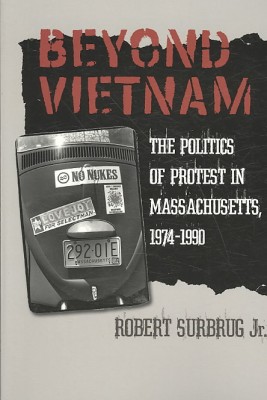| Beyond Vietnam: The Politics of Protest in Massachusetts, 1974-1990 Contributor(s): Surbrug, Robert (Author) |
|
 |
ISBN: 1558497129 ISBN-13: 9781558497122 Publisher: University of Massachusetts Press OUR PRICE: $30.35 Product Type: Paperback - Other Formats Published: October 2009 Annotation: History/United States/State & Local/New England |
| Additional Information |
| BISAC Categories: - History | United States - State & Local - New England (ct, Ma, Me, Nh, Ri, Vt) - Political Science | Political Ideologies - Conservatism & Liberalism |
| Dewey: 322.409 |
| LCCN: 2009030041 |
| Series: Culture, Politics, and the Cold War (Paperback) |
| Physical Information: 0.81" H x 6.24" W x 9.18" (1.04 lbs) 320 pages |
| Descriptions, Reviews, Etc. |
| Publisher Description: Narratives of the 1960s typically describe an ascending arc of political activism that peaked in 1968, then began a precipitous descent as the revolutionary dreams of the New Left failed to come to fruition. The May 1970 killings at Kent State often stand as an epitaph to a decade of protest, after which the principal story becomes the resurgence of the right. In Beyond Vietnam: The Politics of Protest in Massachusetts, 1974-1990, Robert Surbrug challenges this prevailing paradigm by examining three protest movements that were direct descendants of Vietnam-era activism: the movement against nuclear energy; the nuclear weapons freeze movement; and the Central American solidarity movement. Drawing lessons from the successes and failures of the preceding era, these movements had a significant impact on the liberal wing of the Democratic Party, which itself had been undergoing major transformations in the wake of the 1960s. By focusing on one state--Massachusetts--Surbrug is able to illuminate the interaction between the activist left and mainstream liberalism, showing how each influenced the other and how together they helped shape the politics of the 1970s and 1980s. During these years, Massachusetts emerged as a center of opposition to nuclear power, the continuing Cold War arms race, and Ronald Reagan's interventionist policies in Central America. The state's role in national policy was greatly enhanced by prominent political figures such as Senator Edward Kennedy, Speaker of the House Thomas Tip O'Neill, presidential candidate Governor Michael Dukakis, Vietnam veteran Senator John Kerry, and moderate Republican Silvio Conte. What Beyond Vietnam shows is that the rise of the right in the aftermath of the 1960s was by no means a unilateral ascendancy. Instead it involved a bifurcation of American politics in which an increasingly strong conservative movement was vigorously contested by an activist left and a reinvigorated mainstream liberalism. |